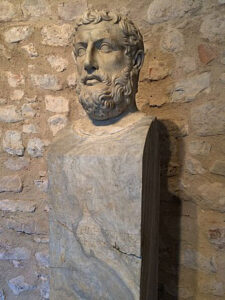Empty Husks Of Words
 I continue to read Nietzsche’s description of the philosophers who came before Socrates/Plato. Plato is the watershed of the intellectual heritage of the West. Plato, a composer of theatrical drama introduces us to Socrates by his collection of Socratic Dialogues. Socrates is an example, teacher/role model. He instructs by provoking reflection, the exercise of body and mind, strolling about the market square of Athens while surrounded by a few friends practicing, — grappling with question and answer, a probing of shared experience. Philosophy from that time until now amounts to a contest, an “agon” between the question and possible answers, among friends. The “agon” is modeled after the Greek gymnasia of two males paired to a match of wrestling. Greeks of the Classical age wrestled naked. One even now must wrestle naked.
I continue to read Nietzsche’s description of the philosophers who came before Socrates/Plato. Plato is the watershed of the intellectual heritage of the West. Plato, a composer of theatrical drama introduces us to Socrates by his collection of Socratic Dialogues. Socrates is an example, teacher/role model. He instructs by provoking reflection, the exercise of body and mind, strolling about the market square of Athens while surrounded by a few friends practicing, — grappling with question and answer, a probing of shared experience. Philosophy from that time until now amounts to a contest, an “agon” between the question and possible answers, among friends. The “agon” is modeled after the Greek gymnasia of two males paired to a match of wrestling. Greeks of the Classical age wrestled naked. One even now must wrestle naked.
Nietzsche had this to say about Parmenides of Elea, a 6th century BC philosopher.
One is not to see that “existent” outside the world as it were above our horizon, but before us, and everywhere in every Becoming, something “existent” and active is contained.
“Do not follow the dim-sighted eyes,” now his command runs, “not by resounding ear nor the tongue, but examine only by the power of thought.”
…By tearing entirely asunder the senses and the ability to think in abstractions, i.e. reason, just as if they were two separate capacities, he demolished the intellect itself, and incited people to that wholly erroneous separation of “mind” and “body” which especially since Plato, lies like a curse on philosophy.
He who judges in such generalizations
as Parmenides did, ceases therewith
to be an investigator of natural philosophy in detail;
his interest in phenomena withers away;
there develops even a hatred of being unable
to get rid of the eternal fraud of the senses.
Truth is now to dwell only in the most faded, most abstract generalities,
in the empty husks of the most indefinite words,
as in a maze of cobwebs;
and by such a “truth” the philosopher sits, bloodless
as an abstraction
surrounded by a web or formulae.
The spider undoubtedly wants the blood
of its victims;
but the Parmedian philosopher hates the very blood
of his victims,
the blood of Empiricism
sacrificed by him.
–Early Greek Philosophy and Other Essays, by Friedrich Nietzsche p. 92, 101-102
I have to sigh in relief. Parmenides advocates that reality is a matter of this world. The finally-real belongs to this world, not to some world “above,” call it heaven, call it “where we go when we die.” What is real within the horizon that we can see, and touch and smell.
Second, Parmenides ever the logician, a thoughtful Greek genuflecting before an altar to logic will abide only what he is certain of. A=A. So he must discount, consider the roiling change that surrounds him as illusion, a trick of the senses, and that the mind’s reason alone producing abstract forms can be “the truth.” Plato obediently takes this fork in the road, and we in the West have been following ever since. This point of view is a shadow that haunts us, is particularly the shadow side of Christian piety in the West.
Caught in the web of our own making, we want blood do we not?
But we hate the blood of those we have sacrificed.
How about a song, this well loved blues tune by the Rolling Stones, You Can’t Always Get What You Want.
2 thoughts on “Empty Husks Of Words”
Well, another interesting and thought provoking post. It sounds as if Parmenides was an early advocate of WYSIWYG, as am I. But I also realize that what I see is not reality, but some form of interpretive dance sent to my neurological receptors through faulty wiring (we all have faulty wiring since our senses developed through evolution for reasons other than what we experience in the world today). Unfortunately the Greeks did not know about evolution, though I suspect given another couple of centuries of uninterrupted exploration of the world around them, they might have come up with the concept themselves. An early version of the scientific method and an early Age of Enlightenment could not have been far off for these great thinkers.
The Greek population, as a whole, was not ready for such thoughts or self-examination (as we note with how Socrates was banished for asking, “WHY?”). 2,000+ years later we still aren’t ready to ask these questions. This, among many other aspects of our behavior, does not bode well for our survival. Since our potential salvation was offered to us on a shiny silver platter by the Greek philosophers (not a nice teacher nailed to a cross – sorry) and we have eschewed that way of observing both the external and internal worlds for eons, we’re screwed. Oh well!
Ouch! Do not, do not take away our suffering messiah! Because he suffers on our behalf, approving our fetishizing of suffering, our self pity. That tattered comfort blanket which we hold with a death-grip, rejecting “what is” choosing to remain inside of our infantile imaginations. Any messiah who dares to show us what is in the mirror is promptly disposed of.